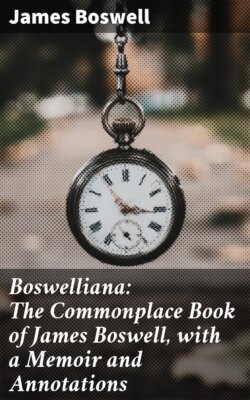Читать книгу Boswelliana: The Commonplace Book of James Boswell, with a Memoir and Annotations - James Boswell - Страница 3
На сайте Литреса книга снята с продажи.
PREFACE.
ОглавлениеTable of Contents
James Boswell had not, by publishing his great work, the Life of Dr. Samuel Johnson, completed his literary plans. He preserved the letters he received from notable persons, and retained copies of his own. For many years he kept a journal, in which he recorded not merely his conversations with Dr. Johnson, but the diurnal occurrences of his own life. Respecting his journal, in a letter to his friend Mr. Temple, dated 22nd May, 1789, he writes:—“You have often told me that I was the most thinking man you ever knew; it is certainly so as to my own life. I am continually conscious, continually looking back or looking forward, and wondering how I shall feel in situations which I anticipate in fancy. My journal will afford materials for a very curious narrative. I assure you I do not now live with a view to have surprising incidents, though I own I am desirous that my life should tell.” Boswell evidently intended to adapt the contents of his journal to an autobiography; his early death precluded the intention.
Besides a journal, Boswell kept in a portfolio a quantity of loose quarto sheets, inscribed on each page Boswelliana. In certain of these sheets the pages are denoted by numerals in the ordinary fashion; another portion is numbered by the folios; while a further portion consists of loose leaves and letterbacks. The greater part of the entries are made so carefully as to justify the belief that the author intended to embody the whole in a volume of literary anecdotes.
At Boswell’s death his portfolio was sold along with the books contained in his house in London. It came into the possession of John Hugh Smyth Pigott, Esq., of Brockley Hall, Somersetshire, an indefatigable book collector. On Mr. Pigott’s death in 1861 the volume, bound in russia, was sold along with the stores of the Brockley library. Purchased by Mr. Thomas Kerslake, bookseller in Bristol, it was afterwards sold by him to Lord Houghton. By his lordship it was lately handed to the Grampian Club, with a view to publication.
Boswell’s commonplace-book exhibits some of the author’s weaknesses, but is on the whole a valuable repertory. The social talk of leading persons during the latter part of the century is graphically depicted. Considerable light is thrown on the character of individuals respecting whom every fragment of authentic information is treasured with interest. In preparing the commonplace-book for the press the Editor has omitted a few entries which transgressed on decorum. He has generally retained the author’s orthography.
The Memoir has been prepared with a desire to depict the author’s history in his own words. Letters to correspondents have been copiously introduced. Of these a most interesting portion have been obtained from the volume of Boswell’s Letters to Mr. Temple, published by Mr. Bentley, under the care of Mr. Francis. It is curious to remark that these letters, like the commonplace-book, left the family of the owner, and were accidentally discovered in the shop of a trader at Boulogne.
The Editor cannot venture to enumerate all the kind friends who have aided his inquiries. He has been indebted to Lord Houghton for important particulars. The representatives of Thomas David Boswell, the biographer’s brother, and of his uncle, Dr. John Boswell, have been most polite and obliging in their communications. The Rev. W. H. Wylie has kindly furnished Boswell’s address to the Ayrshire constituency.
Grampian Lodge,
Forest Hill, Surrey,
May, 1874.
